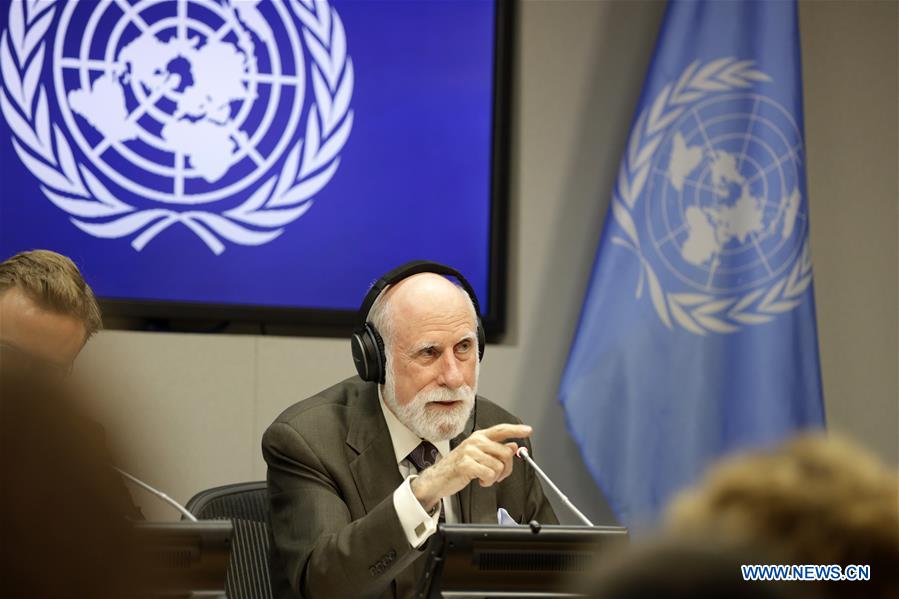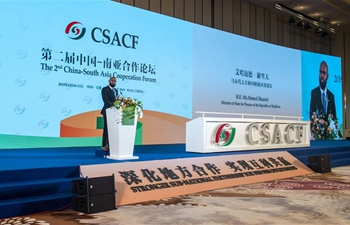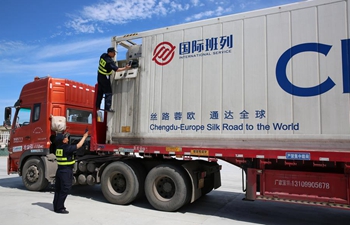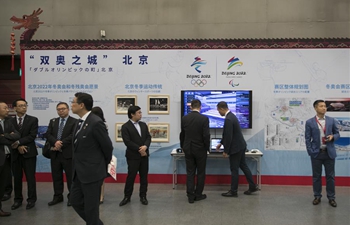 ?
?Vinton Cerf, Chief Internet Evangelist at Google, speaks during a press briefing on the report of the High-level Panel on Digital Cooperation, at the UN headquarters in New York, on June 10, 2019. An expert group appointed by the United Nations called on governments, the private sector and civil society, in its first report released Monday, to work together urgently to maximize the benefits and minimize the harms of digital technologies. (Xinhua/Li Muzi)
UNITED NATIONS, June 10 (Xinhua) -- An expert group appointed by the United Nations called on governments, the private sector and civil society, in its first report released Monday, to work together urgently to maximize the benefits and minimize the harms of digital technologies.
The Age of Digital Interdependence, the 20-person panel co-chaired by Melinda Gates and Jack Ma, laid out a set of recommendations toward that end, which included building an inclusive digital economy and society, developing human and institutional capacity, protecting human rights and human agency, promoting digital trust, security and stability, and fostering global digital cooperation.
Particularly, in building an inclusive digital economy and society, the panel recommended that by 2030, every adult should have affordable access to digital networks, as well as digitally-enabled financial and health services.
It also suggested a multi-stakeholder alliance, involving the United Nations, create a platform for sharing digital public goods, and that international organizations promote action on barriers women and marginalized groups face to digital inclusion and digital equality.
On global digital cooperation, the panel suggested an initial goal of marking the United Nations' 75th anniversary in 2020 with a Global Commitment for Digital Cooperation for an improved global digital cooperation architecture, and "as part of this process, we understand that the UN secretary-general may appoint a technology envoy," the report's summary put it.
In July 2018, the High-Level Panel on Digital Cooperation was established by UN Secretary-General Antonio Guterres. Its co-chairs and members, with digital-related background, come from the government, private sector, civil society and academia.
Over a period of nine months, panel members and the panel Secretariat engaged with more than 4,000 individuals representing 104 states, 80 international organizations, 203 private sector companies, 125 civil society organizations, 33 technical organizations, and 188 think tanks and academic institutions.
Meanwhile, Melinda Gates, co-chair of the Bill & Melinda Gates Foundation, and Jack Ma, executive chairman of the Chinese conglomerate Alibaba Group, on Monday morning had an online conversation with UN Secretary-General Antonio Guterres, whom they handed the report to, on digital cooperation.
Guterres recalled that the growth of the internet began with a "naive optimism," but inequalities have actually grown. He called for digital technology to be used for a "quantum leap" in global development, and for everyone to have access to the internet.
Without a huge commitment and investment in digital inclusion, he said, conflicts and mistrusts will grow.
Jack Ma, for his part, encouraged governments to attach greater importance to investment in digital infrastructure, saying: "If you don't let your people connect to the internet is worse than last century. We should not leave our people in the last century."
Promoting a more inclusive globalization, Ma said: "With the global sale, global buy, global delivery and global pay today, the internet is enabling lots of small business and young people women."
Melinda Gates insisted that women must have a "seat at the table, as the creators of society," pointing out that women entrepreneurs currently receive just 6 percent of venture capital funding for digital start-ups.
Regarding fears over inadequate internet governance, Gates acknowledged that this is a legitimate concern, but noted that the technology sector is coming together to self-govern and collaborate, and that smart regulation, however, is also necessary to solve problems.















